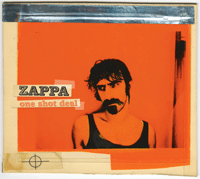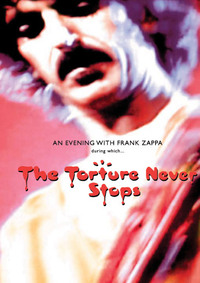Following guitarist-composer Frank Zappa’s death 15 years ago, a lot of impressive unreleased ore has been hacked from the Zappa mines. The latest is the ‘70s stuff collected on “One Shot Deal” and a DVD of a 1981 concert, “The Torture Never Stops.”
MetalJazz’s guest reviewer is my friend Paul Decuir, a Zappa fan since he was a squirt. Paul posseses added insight from having labored on the stage crew at UC Santa Barbara, where Zappa played many times. In fact, Paul’s careers as stagehand and lifeguard were effectively ended when he wrecked his back moving a piano for the Eagles. He’d have felt better if the sacrifice were endured on Zappa’s behalf. (He’s a computer guy now.)
Paul came over to Burk’s Lodge to shoot some pool and shoot the shit about “One Shot Deal.” As we join the discussion, the first cut, “Bathtub Man,” is spinning . . .
Paul: Zappa just gets ON it. And this has got all the good players. The recording, I’m not quite sure if it was live or not. [The singer moans: “Whoaaa, that broad in the bathtub was a man.”] This was circa ’74, so you had Napoleon Murphy Brock on lead vocals, George Duke on keyboards, Tom Fowler on bass, Chester Thompson on drums, and Ruth Underwood was doing the xylophone and percussion. George Duke’s keyboards just really started shining on this tune. He had mostly been playing trombone, so he didn’t do a lot of singing or anything else. You can tell, he’s got that roll, budittiyaba . . .
Greg: Yeah, he’s got the blues.
Paul: Chester -- I’ve always been a huge fan of his. And the first time I heard his riffs when he played with Genesis, I knew exactly who it was.
Greg: The way he tunes his drums is kind of interesting, he’s got that real soft, springy feel, it’s almost like he’s hittin’ ‘em with mallets instead of drumsticks. Real soft on the cymbal, too. [A crazed blues wah ensues.] Yeah, here comes Frank. [Laughs at Zappa’s aural antics.]
Paul: I’m not sure where this was recorded. It may have been live in his house or something. You don’t hear anybody in the background, and I know he had a studio there.
Greg: You were saying something about the sound of this track being raw? It sounds fine to me.
Paul: Compared to the rest of the disc, though, the rest of it is a lot more polished.
Greg: He’s just playing the blues. He could probably do this in his sleep.
Paul: He could probably do it while he’s swimming! In the early ‘70s, when I was seeing him all the time, you’d be guaranteed some kind of just over-the-top solo on every disc that he put out. But this is f*ckin’ burning.
Greg: You were saying when he’d do a tour, he’d almost never play the current album?
Paul: Yeah, he’d play his next album.
Greg: Did that piss people off?
Paul: Not so much. Everybody still generally dug the show, because they were here to see the virtuoso. He gets into two tunes here where he just kind of diddles around -- “Space Boogers” and “Hermitage.” [Sounds of squiggly guitar noise.] But in “Trudging Across the Tundra,” it’s sort of the time of his hit single, “Yellow Snow.” Because here you’ve got “Australian Yellow Snow,” which was recorded in Sydney, and “Trudgin’ Across the Tundra” is part of that. But “Occam’s Razor” is an extrapolation on a piece from [the 1979 “opera”] “Joe’s Garage.” It just flames, man. [Sounds of gooshing guitar effects and strange metallic tinkles.] This is “Hermitage.” He used to be very enthusiastic about bass riffs and drum riffs and low-end sonic music. So this is kind of an experimentation with that.
Greg: So you would frequently go backstage, and the band would recognize you. Did you talk to Zappa, too?
Paul: Yeah. I had a couple of photo sessions with him.
Greg: So he’d say, “Here’s that asshole comin’ again. You hit him high, and I’ll hit him low . . .”
Paul: We usually had a Winston together. Nobody was allowed to smoke or party before the show, because they had to be so precise. Afterward they’d sorta, but beforehand it was nothing but a cigarette.
Greg: You’re talking about UCSB, when you were doing stage crew. How many times did he play there?
Paul: That I saw him, probably about eight times. I was there for seven years. And I saw him seven or eight more times down in L.A. [Sound of flying trumpet on “Trudgin’ Across the Tundra.”] He does a lot of these swirly sort of mixes.
Greg: Would Zappa always have a vocalist with him?
Paul: Yeah. And Napoleon Murphy Brock was my favorite vocalist.
Greg: I like this [“Trudgin’”]. This is great spacy stuff.
Paul: This is really kinda neat. But then “Occam’s Razor,” his guitar work on it is absolutely phenomenal.
Greg: Great trombone smears there behind the trumpet.
Paul: [Consults the booklet.] There’s three guys on trumpet -- Malcolm McNab, Gary Barone, Tom Malone. And Bruce Fowler was playing trombone. This is ’72.
Greg: What was Zappa’s demeanor like, backstage before a show?
Paul: The sound checks would go pretty clean, and he’d be conducting more than playing, but he was pretty jovial. He had a bodyguard, though, because he had been thrown off the stage in Europe. And I think one of the last times I saw him backstage, he had one of these great big guys with him.
Greg: He was thrown off the stage?
Paul: By a fan’s husband/significant other. And he broke his leg. [Zappa is really stinging the guitar now. Paul chuckles and chokes on his beer.]
Greg: He’s always playing the SG at this point, right?
Paul: Yeah.
Greg: What percentage of his shows was comedically oriented?
Paul: I would probably say about 20, 25 percent would be maybe a little bit of a lighter stance. He’d get pretty animated, being the conductor that he was. But to say comedic -- you could call some of his music comedic. Until the “Zoot Allures” period [1976], when he got a lot more serious, and [drummer] Terry Bozzio joined the band back then, and [guitarist] Steve Vai was with him, too, he was playful most of the time when he was onstage, but when they would play, and when they were lining up, I mean, everybody was dead on.
Greg: “Yellow Snow” was not released as a single, was it? But it was the radio hit.
Paul: Some DJ edited it, and that’s how it got out as a single.
Greg: So mostly he was out front conducting, and then he would step up and do his spotlights on guitar?
Paul: Yeah. And he gave everybody their own chance to shine and get big solos in, too.
Greg: So what would happen after the show?
Paul: A few “friends” would come by and visit him. [Laughs.]
Greg: Taking care of his corporeal needs? What kind of groupies was he pulling back then?
Paul: Oh, there were some pretty wild ones.
Greg: Did he get good-lookin’ ones?
Paul: Oh yeah. He was right up there with the Eagles as far as the caliber of the groupies. But then, I was in Santa Barbara.
Greg: You had a lot of great-looking chicks around there. And that’s why you went to school there, right?
Paul: Absolutely. Trampoline and women.
Greg: And women on trampolines.
Paul: I had a girlfriend back there who was in trampoline class . . . [Paul changes the subject.] The guy that used to do Zappa’s lights was amazing -- Ian Underwood, I’m pretty sure that was him. He wasn’t playing at that point. [Ian had played various instruments on early Zappa albums.] He had that real thick frizzy hair that was kind of angled.
He had these crates that were pneumatically controlled, and all these light poles would come up and extend out. It was a totally different light show; it was the one he carried around with him. It was quite effective. He’d have the flashing colored lights for solos and whatnot. Several parts of songs, Zappa would go off for two or three minutes and just strain that guitar. [An example is playing, “Occam’s Razor.”]
Greg: Nice keyboards here. [Miles-like electric piano with strange harmonies.]
Paul: [Reads booklet.] Vinnie Colaiuta, drums. Arthur Barrow, bass. Ed Mann, percussion. Tommy Mars, keyboards. Denny Walley, guitar. Peter Wolf, keyboards. And Warren Cucurullo was playing guitar with him at that point, too. This was recorded in ’79, I think.
Greg: So Zappa’s wife put this together according to groupings she found in a drawer, outlined by Frank?
Paul: On the liners, it says tracks 1 through 4 were grouped together, and tracks 8 and 9 were grouped together, which is the “Yellow Snow” stuff.
Greg: [The end of “Occam’s Razor” is playing.] This is a very typical Zappa-type fanfare. Quick cut, and splice it together into the next track.
Paul: This is 1978. This is called “Heidelberg.” There’s a lot of low-end experimentation on this one. The next one is “The Illinois Enema Bandit,” which I’m gonna make you listen to.
Greg: Oh no!
Paul: It’s the guys basically from “The Torture Never Stops.”
Greg: What did you think of that DVD?
Paul: I think the vocalist is Ray White, and he wasn’t necessarily my favorite. But the guy who did percussion for that was great -- Ed Mann. And Steve Vai, it was semi-early in his period with him; Vai didn’t really have any solos. The keyboardist and percussionist were really prominent, because the keyboardist was also the main vocalist. For that period of time -- “Sheik Yerbouti,” “You Are What You Is,” sort of the early-‘80s, trendy-colored-shirt, necktie-wearing thing [Paul cringes] -- it was pretty representative of how his stage shows were.
Greg: You saw him in that period?
Paul: Yeah. Here’s your favorite song, Greg. [“The Illinois Enema Bandit,” a stupid comedy blues.] Frank kicks ass on guitar. This tune is much better than any of the pieces I saw on “The Torture Never Stops.” He’s describing something made of rubber, and somebody’s got a little squeak horn or something. And there was a lot of experimenting with different sounds that you wouldn’t ordinarily hear. None of the other bands were playing with the same kind of sound-producing devices. I think this is a great picture. [The simple high-contrast face shot on the cover.] Frank gets up and gets on his SG here. [Admittedly a grand solo.] Vai started doing the main solos in the ‘80s.
Greg: Why was that? Do you think Zappa was starting to get a little sick?
Paul: I don’t think he could hit the same 16th notes as he could earlier. Zappa had a sense of humor about everything, but a lot of his stories were about peculiar bodily functions. In this song here, there’s a guy who runs around and ties up women on campus and gives ‘em enemas. So they’re bringing him into court to be prosecuted, and there are women in the background going, “Let him go! Let him go!” So you got some great guitar work and great musicianship, and the basic story of the song, and that’s important.
Greg: All right, enough! You’re not gonna make me listen to any more of this song!
Paul: You’d come away from a show, and you’d just be shaking your head, grinning. And then just being in such anticipation of the next disc, because you knew that when you saw him, a lot of that would be on it. [We skip to the last song, “Rollo.”] This is pretty interesting.
Greg: Got a little soprano sax here. This has that symphonic thing going on.
Paul: It kind of reminds me of “200 Motels” from 1971. You’ve got everybody running around, doing shit. [Jagged neoclassical weirdness ensues.] “The Torture Never Stops,” it was so ‘80s. I mean, it has some good stuff on it. However, that 1974 album is great -- the one that “Yellow Snow” and all that is from.
Greg: “Apostrophe,” right? That’s the one that you probably used to play most for me back then.
[Sounds of Greg vainly chalking his cue as Paul runs the table.]
Greg: Goddamn you.



